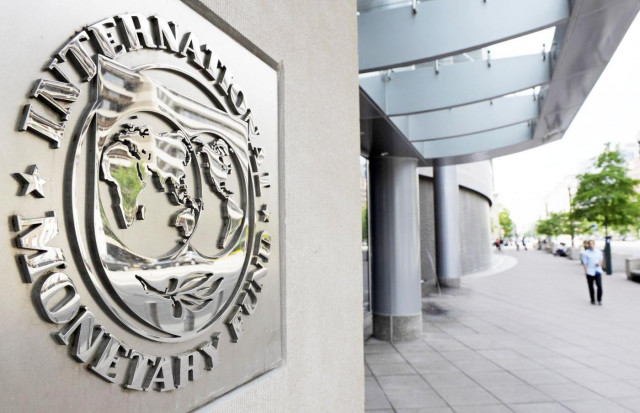The low oil price opportunity
It seems, IMF is finally pushing the government to fill $6 billion hole in its foreign exchange reserves

IMF is encouraging the government to increase its purchases of US dollars from the currency markets to build up government reserves to close to the $15.4 billion mark. PHOTO: AFP
This is not a cosmetic exercise. For the last two decades, the government has sought bailouts roughly every five to seven years from the IMF that have been strangely similar in size. In effect, the government has a $6 billion hole in its foreign exchange reserves that it keeps asking the IMF to fill in every time it runs out. The speed at which the government runs out of this money depends on two variables: how badly the government is managing the energy sector and how fast global oil prices have been rising. Managing the energy sector well appears to be something that Islamabad has decided it is completely incapable of, but never once, apparently, has it occurred to the government of Pakistan to build up reserves when oil prices are down.
Now, it seems, the IMF is finally pushing the government to fill that hole, and we are inclined to agree that this should be a priority for the government. Taking government reserves to $15.4 billion would mean that total foreign currency reserves for Pakistan (which would include US dollars held by private citizens in foreign currency accounts at local banks) would amount to $20.5 billion. Even once the government pays back the IMF bailout, that would still leave $14 billion in reserves, enough to cover just over four months of imports, even if high oil prices were to return. Simply put, this is one of the ways the government can ensure it does not have to return to the IMF the next time oil prices shoot back up to $100. Given the volatility in oil prices, that scenario cannot be ruled out and so the best thing Islamabad can do is be prepared.
Now, we understand that Finance Minister Ishaq Dar appears to have an emotional attachment to the rupee staying at approximately the Rs100 to the US dollar mark. And indeed, a stable exchange rate is not a bad thing. But the finance minister needs to swallow his pride in bringing the exchange rate back down and allow it to go back up in the short run if it means gaining the ability to maintain long-term macroeconomic stability, including in the currency’s exchange rate.
All of Pakistan’s financial crises have been precipitated by the government’s inability to handle its finances and to use the policy tools at its disposal wisely. It often appears that nobody in Islamabad seems to think that long-term planning, predicting the inevitable and preparing for it, is their job. It is not ideal to have a Washington-based lender lecturing our government to do the right thing. But we would take that over all of Islamabad choosing to remain asleep at the wheel. Mr Dar may not like what the IMF is asking for, but it is the right thing to do.
Published in The Express Tribune, April 9th, 2015.
Like Opinion & Editorial on Facebook, follow @ETOpEd on Twitter to receive all updates on all our daily pieces.



















COMMENTS
Comments are moderated and generally will be posted if they are on-topic and not abusive.
For more information, please see our Comments FAQ